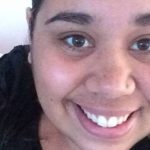
Shanice Griffen
Indigenous Health Scholarship 2022
University of Newcastle, NSW
Bachelor of Medicine
Scholarship Awarded 2016
Sponsored by:
Rotary District 9650 Inc.
How will I contribute to improving Indigenous health as a qualified medical practitioner or health worker?
When I become a qualified medical practitioner, I aspire to help the Indigenous peoples of Australia by improving their overall health and preventing chronic illnesses.
I am to do this by working rurally and remotely in Aboriginal communities all over the country. I would like to work within an outreach program that targets Indigenous health, usually in remote communities but can also be in rural communities. By doing this I am assisting them in medical attention that would be harder for them to receive because of living hundreds of kilometers from medical services.
With these outreach programs, in addition to treating the sick, I would also like to educate these Indigenous communities into the prevention of chronic diseases that are very common among the Indigenous population. I would like to educate them about healthy eating, staying active and hygiene. Along with this education is the benefit of the prevention of these disease, which will also in turn assist in reducing the gap between Indigenous and non-Indigenous health. I would educate as many members of the communities a s possible and tell them to go home and teach their families. With the outreach program, I hope to engage with Indigenous peoples of ages, both young and old.
I will also aim to build relationships and connections within the community. By doing this I will make the patient feel more comfortable to seek medical help when they are ill, it will make them feel more comfortable to talk and be treated by me.
Current Progressive Report
In semester 1 of 2019 I started my fourth year of a Bachelor of Medicine. My second attempt at year 3 was successful and I was ready to continue. Year 4 and year 5, the last two years of the degree are hospital based. I was allocated to the Maitland Hospital, which is a 30-minute drive from where I live in Newcastle. I was not excited about the driving but was as keen as ever to start my first rotation in general medicine. There was 5 people in our year group in general medicine at the Maitland Hospital and we were all allocated to a specific team. The team I was allocated to was general medicine, as well as cardiology. We started at 8 every day for the handover meeting which I always found interesting. Sometimes if we had time, the doctors would teach certain medicine topics and analyse journal articles for specific conditions or medicines. We would then go to ward rounds where there were many people that combined to make our team. We had a consultant, a registrar, a resident, a junior medical officer, a fifth-year medical student and I, the fourth-year medical student. I didn’t really understand the medical hierarchy of positions until I started in the hospital. I found it great seeing patients when they are first admitted, following their diagnosis through history taking, examination and investigations and following through the treatment until they are discharged. All the doctors were a great source of knowledge and were so helpful. I finally had many light bulb moments where knowledge we learned from the previous three years were finally clicking and coming together. It was a lot easier to remember conditions as well when I had patients to relate it to. During this rotation I was expected to learn a vast list of conditions and learn how to interpret many different investigations that were related. I struggled a bit with this due to the long hours at the hospital. Although after a few weeks, the routine became easier. The biggest assessment I had to constantly practice for during this rotation was a long case. For this assessment, we were given a patient and their medication list, and our task was to take their history and examine them within an hour. We then had to present our finding to the consultant we were allocated to, give our provisional diagnosis, our differential diagnoses and summarise the history and examination. We were then questioned by the consultant around the patient and their condition/s. After many weeks of preparation, it paid off and a passed this assessment.
The next rotation within this semester was general surgery. I have always been interested in seeing what it was all about. Every week we would do a surgery related presentation to our class and the surgeon, we would be allocated between being on the wards and doing rounds and being in the surgery suite. The first surgery I got to see was a parathyroidectomy. It was such an interesting opportunity. I practiced scrubbing in, thinking I would just be watching, but the doctor asked me to assist by holding the retractor to keep the incision open. Some other surgeries I got to see during my time on this rotation was appendicectomies, many colonoscopies, bowel resections and colostomy bags being placed on. The ward rounds started at 7 each morning but were a lot quicker than that of the medicine ward rounds. It was very useful being on ward rounds then in surgeries. With some patients you would see them before surgery, during and then after. It became a lot clearer, the issues that we must consider when performing surgery and along with that the medication effects and the many common complications we need to be aware of.
Overall, I enjoyed my first rotation in the Maitland Hospital. I really enjoy being in a smaller hospital where people know my name and there is plenty of support around from doctors, allied health specialists and other students.